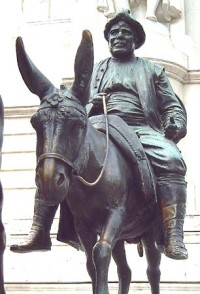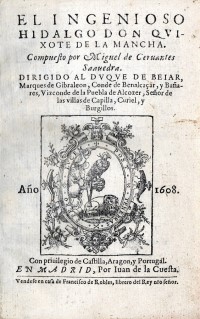“Now they are tied,” said Sancho; “what are we to do next?”
“What?” said Don Quixote, “cross ourselves and weigh anchor; I mean, embark and cut the moorings by which the bark is held;” and the bark began to drift away slowly from the bank. But when Sancho saw himself somewhere about two yards out in the river, he began to tremble and give himself up for lost; but nothing distressed him more than hearing Dapple bray and seeing Rocinante struggling to get loose, and said he to his master, “Dapple is braying in grief at our leaving him, and Rocinante is trying to escape and plunge in after us. O dear friends, peace be with you, and may this madness that is taking us away from you, turned into sober sense, bring us back to you.” And with this he fell weeping so bitterly, that Don Quixote said to him, sharply and angrily, “What art thou afraid of, cowardly creature? What art thou weeping at, heart of butter-paste? Who pursues or molests thee, thou soul of a tame mouse? What dost thou want, unsatisfied in the very heart of abundance? Art thou, perchance, tramping barefoot over the Riphaean mountains, instead of being seated on a bench like an archduke on the tranquil stream of this pleasant river, from which in a short space we shall come out upon the broad sea? But we must have already emerged and gone seven hundred or eight hundred leagues; and if I had here an astrolabe to take the altitude of the pole, I could tell thee how many we have travelled, though either I know little, or we have already crossed or shall shortly cross the equinoctial line which parts the two opposite poles midway.”
“And when we come to that line your worship speaks of,” said Sancho, “how far shall we have gone?”
“Very far,” said Don Quixote, “for of the three hundred and sixty degrees that this terraqueous globe contains, as computed by Ptolemy, the greatest cosmographer known, we shall have travelled one-half when we come to the line I spoke of.”
“By God,” said Sancho, “your worship gives me a nice authority for what you say, putrid Dolly something transmogrified, or whatever it is.”
Don Quixote laughed at the interpretation Sancho put upon “computed,” and the name of the cosmographer Ptolemy, and said he, “Thou must know, Sancho, that with the Spaniards and those who embark at Cadiz for the East Indies, one of the signs they have to show them when they have passed the equinoctial line I told thee of, is, that the lice die upon everybody on board the ship, and not a single one is left, or to be found in the whole vessel if they gave its weight in gold for it; so, Sancho, thou mayest as well pass thy hand down thy thigh, and if thou comest upon anything alive we shall be no longer in doubt; if not, then we have crossed.”
“I don’t believe a bit of it,” said Sancho; “still, I’ll do as your worship bids me; though I don’t know what need there is fortrying these experiments, for I can see with my own eyes that we have not moved five yards away from the bank, or shifted two yards from where the animals stand, for there are Rocinante and Dapple in the very same place where we left them; and watching a point, as I do now, I swear by all that’s good, we are not stirring or moving at the pace of an ant.”
“Try the test I told thee of, Sancho,” said Don Quixote, “and don’t mind any other, for thou knowest nothing about colures, lines, parallels, zodiacs, ecliptics, poles, solstices, equinoxes, planets, signs, bearings, the measures of which the celestial and terrestrial spheres are composed; if thou wert acquainted with all these things, or any portion of them, thou wouldst see clearly how many parallels we have cut, what signs we have seen, and what constellations we have left behind and are now leaving behind. But again I tell thee, feel and hunt, for I am certain thou art cleaner than a sheet of smooth white paper.”
Sancho felt, and passing his hand gently and carefully down to the hollow of his left knee, he looked up at his master and said, “Either the test is a false one, or we have not come to where your worship says, nor within many leagues of it.”
(Source: Miguel de Cervantes Saavedra: Don Quixote. Translated by John Ormsby. Part II Chapter XXIX In: Gutenberg Project.)

